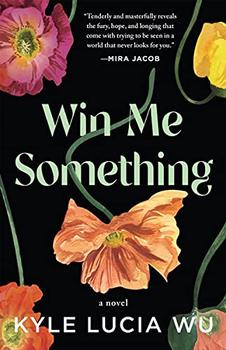Summary | Excerpt | Reading Guide | Reviews | Beyond the Book | Read-Alikes | Genres & Themes | Author Bio

This article relates to Win Me Something
 Willa Chen, the main character in Kyle Lucia Wu's Win Me Something, mentions that her mother named her after the writer Willa Cather. This connection is significant in that Willa expects to be asked about her name in the context of her Chinese heritage, and is surprised when her employer's brother asks about the origin of her first name instead of her last. It is also significant in that Cather, now considered a quintessentially American writer, wrote stories about immigrants and characters who feel like outsiders in American society, as Willa often feels. As author David Burr Gerrard says in a blurb for the book, "Like a latter-day Willa Cather, after whom her protagonist is named, Kyle Lucia Wu has written a beautiful novel about a fiercely American young woman whose Americanness is constantly questioned by those around her."
Willa Chen, the main character in Kyle Lucia Wu's Win Me Something, mentions that her mother named her after the writer Willa Cather. This connection is significant in that Willa expects to be asked about her name in the context of her Chinese heritage, and is surprised when her employer's brother asks about the origin of her first name instead of her last. It is also significant in that Cather, now considered a quintessentially American writer, wrote stories about immigrants and characters who feel like outsiders in American society, as Willa often feels. As author David Burr Gerrard says in a blurb for the book, "Like a latter-day Willa Cather, after whom her protagonist is named, Kyle Lucia Wu has written a beautiful novel about a fiercely American young woman whose Americanness is constantly questioned by those around her."
Cather, who was born in 1873 in Virginia, moved to Nebraska with her family when she was nine years old. Her subsequent experiences growing up in the Great Plains brought her into contact with immigrant communities, and this would have a notable influence on her writing later on. After studying at the University of Nebraska and beginning a career in journalism, Cather began to establish herself as a poet and fiction writer. She published a short story collection, The Troll Garden, in 1905. The collection came to the attention of S.S. McClure of McClure's Magazine, who later invited her to work for the publication in New York City. Her editorial position at McClure's allowed her to establish connections there, and the magazine serialized her first novel, Alexander's Bridge, in 1912.
Her next three novels, O Pioneers! (1913), The Song of the Lark (1915) and My Ántonia (1918), are known as her "Prairie Trilogy." These works, which were generally well-received, depict the type of American frontier life that Cather experienced as a child. She moved away from the settings of these books with later novels such as One of Ours (1922) and Death Comes for the Archbishop (1927), but she is remembered for her depictions of prairie living, and celebrated for centering women and immigrants in her work.
Criticism has been leveled at Cather for the nostalgic, romantic style of her fiction, and she has also been accused of sexism and racism. Nevertheless, her writing earned her international fame, and continues to hold appeal for many marginalized people in America. Cather existed outside of societal norms herself: Despite being an intensely private person who never identified herself in terms of sexuality, her closest relationships were with women, and she lived with a female companion, Edith Lewis, from the early 1900s until her death in 1947. Cather's experience of not conforming to heterosexual expectations likely influenced her work; for example, scholars have suggested that in her short story about a restless and disturbed young man, "Paul's Case," the protagonist is implied to be gay.
"Paul's Case" has something in common with Wu's novel, as it depicts a dissatisfied young person existing as an outsider in New York City. In Cather's story, Paul endeavors to escape the confines of his dreary middle-class existence by stealing money to fund a stay in the city that ends in disillusionment and destruction. Willa's situation is different in that she is much less impulsive and eventually develops a more stable sense of herself through her contact with upper-class New Yorkers, but she still suffers from feelings of desperation and of not belonging in the life she has been born into.
Interestingly, Win Me Something is not the only example of a creative work by an Asian American that has drawn a significant link to Cather. Director Lee Isaac Chung based his Oscar-nominated film Minari, about a Korean American family farming in the Ozarks, on Cather's My Ántonia after the writer's name came to him in a flash of spontaneous, inexplicable inspiration that he describes to the Los Angeles Times "[a]t the risk of sounding like a mystic or a fool." In an essay for Electric Lit, Alyssa Songsiridej points out the racism in how Chung's narrative has been depicted as foreign from an American perspective, while Cather's white Bohemian immigrants are not othered in the same way.
Willa Cather, courtesy of poets.org
Filed under Books and Authors
![]() This article relates to Win Me Something.
It first ran in the November 17, 2021
issue of BookBrowse Recommends.
This article relates to Win Me Something.
It first ran in the November 17, 2021
issue of BookBrowse Recommends.
Your guide toexceptional books
BookBrowse seeks out and recommends the best in contemporary fiction and nonfiction—books that not only engage and entertain but also deepen our understanding of ourselves and the world around us.